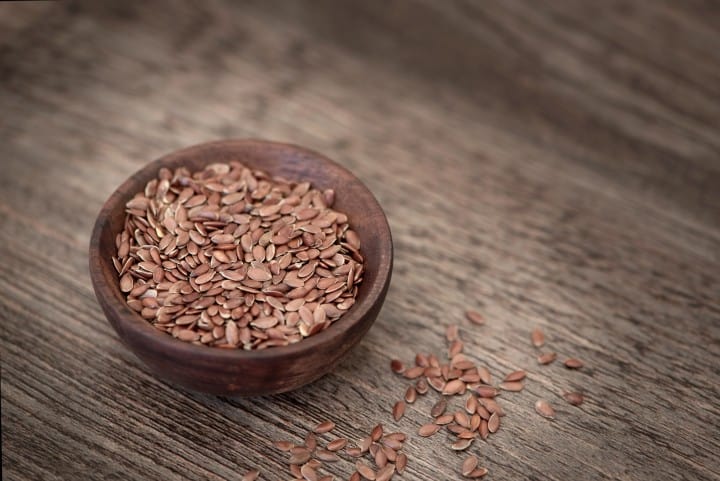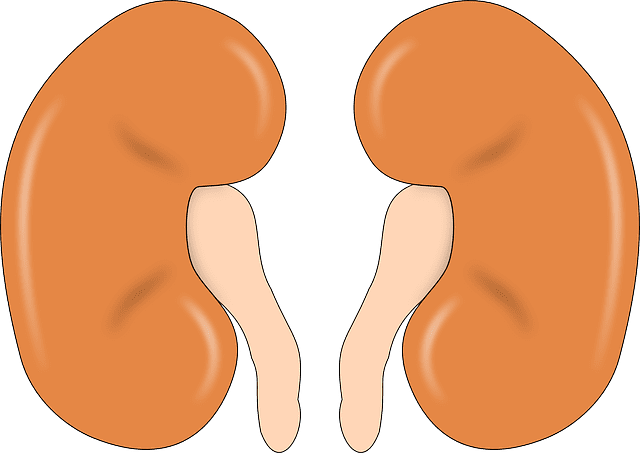What are some unknown benefits of flaxseed tea?
Flaxseed tea benefits are bountiful. Flaxseed is a plant-based food used as an Ayurvedic medicine for thousands of years in Asia. People grew flaxseeds as a crop in ancient Egypt and China.

Flaxseed is available in many forms, including oils, capsules, powder, and flour. As flaxseeds have many health benefits, people use them as a dietary supplement to prevent diabetes, high blood pressure levels, high cholesterol levels, cardiovascular diseases, and breast cancer [1].
In this article, you will learn about every aspect of flaxseed, its nutritional value, health benefits, and risk factors associated with its excessive use.
What are flax seeds?
Flax seeds are one of the oldest crops in the world. It is obtained from plants that provide many crucial fats, antioxidants, and fiber to our bodies.
According to some people, it is a “functional food,” as it helps people boost their health after eating it. The primary nutrients included in flaxseed include antioxidants, fiber, lignans, and polyunsaturated fatty acids like omega- or 3- alpha-linolenic acid (ALA). Research shows that these nutrients help decrease the risk of various diseases, including high blood pressure and cholesterol, help maintain a healthy weight and cardiovascular diseases, and reduce cancer risk [2].
Because of its versatility, flaxseed can enhance the taste and texture of many recipes, including cereals, smoothies, soups, salads, sandwiches, and herbal flax tea.
How to make a flaxseed tea recipe?

Flaxseed Tea can be used to prevent many diseases, and its recipe is given below.
Ingredients:
Following are the ingredients used to make flax seed tea.
- 2 Tbsp. Whole flaxseed (30ml)
- 2 cups Boiling water (500ml)
- Lemon Slice (few drops) (optional)
- Maple Syrup (1tbsp) (optional)
Instructions:
- First, place the whole flaxseed in a teapot.
- Next, add two cups of boiling water, and let it steep for 15 minutes.
- Lastly, add a lemon slice and use maple syrup to make it sweeter.
Yield: 2 cups/ 500 mL.
Serving Size: 1 cup/ 250 mL.
What is the nutritional value of this recipe?
The main ingredient of this recipe is flax seeds, also known as Linseeds. It contains many nutrients, including iron, potassium, calcium, sodium, phosphorus, fiber, and omega-3 fatty acids. Flax seeds have many antioxidants that help scavenge against diseases like cardiovascular diseases and cancer. If lemon is used in flax seed tea, it adds additional benefits to the tea as it contains vitamin C, which will help improve a person’s immunity.
This flax seeds tea help in improving digestion and will also help the liver in its detoxification process. In addition, it helps in bile production and is used to treat various neurological conditions [3].
Here are some amazing benefits of flaxseed tea
Flaxseeds/ Linseeds tea has many benefits. It promotes good bacteria in the stomach and helps keep the digestive system working smoothly and healthy. Apart from that, it also contains omega-3, which helps to maintain your heart health, control your cholesterol, and also helps maintain your blood pressure level [4].
Prevent cancer growth
Flax seed oil obtained from the flax plant has many health benefits, one of which is that it helps prevent cancer of various types. Clinical cancer research on animal models shows that flax seeds can reduce the formation of multiple cancers, including the colon, breast, skin, and lungs [5].
It helps to regulate the increased levels of sex hormones in the blood, which has been associated with an enhanced risk of developing cancers [6]. Flax seeds contain a fatty acid that can decrease the serum level of sex hormones in obese women, which may decrease the risk of breast cancer [7].
Flaxseeds also play a crucial role in protecting the body against prostate cancer [8]. Several studies reported its role in preventing cancer, but still, more research is required to draw a definite conclusion. One animal study found that mice with lung tumors who consumed a 10% flaxseed diet had developed fewer tumors than the control group mice.
Improves cholesterol levels and heart health

Flaxseed oil also helps in lowering cholesterol levels and can reduce cholesterol levels by 6-11%. The alpha-linolenic acid (ALA) present in flaxseed oil might significantly decrease the low-density lipoprotein (LDL), or “bad” cholesterol. One study was conducted to observe the effect of flax seeds oil on the cholesterol level in which 15 adults were given either flax seed or corn oil with dinner. After 12 weeks, it was observed that adults who consumed corn oil didn’t change their cholesterol level, but those who consumed flax seed oil significantly decreased the bad cholesterol [9].
Flax seeds are also associated with heart health because of omega-3, lignans, and fiber. In addition, high cholesterol, especially LDL cholesterol, is a significant risk factor for cardiovascular diseases [10]. Therefore, these seeds are beneficial if consumed along with other cholesterol-lowering medication.
Flax seeds have a high content of insoluble fiber and lignin that can bind with cholesterol-rich bile acids and decrease cholesterol levels [11].
Rich Source of omega-3 fatty acids and Fiber
Flax seeds also are a riched source of omega-3 and fiber, are essential, and have many benefits for heart health. It helps in platelet function, inflammation, and controlling blood pressure.
It helps in reducing the risk of heart disease by decreasing inflammation in the arteries and will also help in lowering the risk of stroke and chronic kidney disease.
One study shows that people with cardiovascular disorders who were given 2.9g of ALA daily for one year had lower death rates and heart attacks [12].
Lessen pain & inflammation in arthritis

Studies show that flax seeds oil also significantly reduces pain and inflammation associated with arthritis. In flax seed oil, omega-3 fatty acids are present, which benefit people with arthritis. In flax seed oil, various anti-inflammatory agents are present, which can help reduce inflammation, lead to severe aches and pains in joints, and reduce arthritis.
Also, flax seed oil is rich in fatty acids, which can help improve joint inflammation. However, some studies suggested that flax seed oil isn’t very effective in treating rheumatoid arthritis. Research is still needed to determine whether it is safe to use flax seed for treating rheumatoid arthritis [13].
Reduce hot flashes in menopausal women
Flaxseed is a good source of plant-based compounds, like lignans, that have a weak estrogen effect. Due to its soft estrogen effect, researchers think that flaxseed might help ease hot flashes and other menopausal symptoms in women. These hot flashes and night sweats in women are often termed vasomotor symptoms.
According to one study, women who ate fiber bars in which flax seeds were present had a drop of 33% in their vasomotor symptoms and hot flashes compared to control group women. Flax seeds also help maintain a level of estrogen and ultimately prevent cancer risk [14].
Controls blood sugar levels

Flax seeds may also help to stabilize and control sugar levels in the blood and treat diabetes. Based on a review of 25 studies, whole flax seeds can decrease blood sugar and prevent insulin resistance which will help regulate blood sugar levels.
This blood sugar-lowering effect is due to the fiber content of flax seeds, which causes this by absorbing the excessive sugar present in the blood. However, flaxseed oil doesn’t have fiber content, so the benefits of flaxseed for blood sugar control are mainly observed.
Flaxseed oil is also crucial for decreasing the risk of diabetes. One study showed that people with prediabetes who consumed 13 g of flaxseed significantly reduced their blood sugar levels. However, those who ate higher doses of flaxseed did not change their blood sugar level [15]. So, it shows that one should have to take flaxseed in a specific amount to get significant results.
Fight constipation

Flax seeds also play a significant role in preventing constipation as of their high fiber content. Just one tablespoon or 7g of ground flaxseed contains almost 2g of fiber, approximately 5% and 8% of the recommended intake for males and females, respectively [16]. Furthermore, flax seeds contain two types of fiber in them, including soluble and insoluble fiber. These insoluble fibers can be fermented by the bacteria in our intestines and help protect the gut’s health and improve.
While the soluble fiber absorbs water in your intestines and slows digestion, which helps regulate blood sugar levels and decrease cholesterol levels. Insoluble fiber is responsible for adding bulk to the stool, help in preventing constipation, and promoting regular bowel movements [17].
Protects against kidney injury

Flaxseed oil also helps in protecting against kidney injuries. In the kidney, it plays a significant role in reducing renal damage in polycystic kidney disease. It is also responsible for lowering the C-reactive proteins and inflammation in chronic kidney failure patients [18].
Flaxseed helps improve kidneys’ functioning by reducing blood thickness and decreasing cholesterol levels and swelling. Studies suggest that flax seeds can reduce cholesterol levels and improve kidney health.
Flaxseed has a very high phosphorus content, so taking one tablespoon of flaxseed oil contains 62mg of phosphorus, and 7% of the daily dose of phosphorus is recommended for patients with kidney failure. So, one should have to eat flax seeds to improve kidney failure due to their high phosphorus content after consulting with their doctors.
Protect against radiation exposure
Flax seeds have high omega-3 fatty acid and lignin content that act as antioxidants and protect the body against various radiation exposure. Flax seeds might have a role in protecting healthy tissues and organs from the radiation’s harmful effects.
They have found that mice on a flaxseed diet have protected and healthier lung tissues when exposed to radiation than the control group. It shows that flax seeds significantly reduce tissue damage after exposure to other radiations.
Assist weight loss

Flax seeds are essential in losing or maintaining a healthy weight primarily because of their high fiber content. As fiber helps in making you feel full by minimizing your appetite, which results in decreasing the daily intake of calories.
Flax seeds can also be used as a snack in your diet that you can have for munching between meals as it will reduce food consumption and help in weight loss. One study suggests that adding just 2.5g of ground flax seeds to your beverages helps lower your hunger and overall appetite and helps in reducing body mass index (BMI).
Flax seeds are very rich in soluble fiber, so it slows down the digestion in your stomach and initiates various hormones that control appetite if taken empty stomach. As a result, flax seeds make you feel full for more extended periods, which will ultimately help in losing weight [19].
Are there any risks associated with its use?
Although there are many beneficial roles of consuming flax seeds, many side effects are also associated with consuming flaxseeds in large amounts, either by excessive consumption of flax seeds or herbal teas. Some main risks of flax seeds include constipation, allergic reactions, bleeding disorders, and many more.
- It can cause allergic reactions. If you feel any itching, swelling, or redness, then you should have to stop the use of flax seeds. Vomiting and nausea can also be an indicator of an allergy.
- It can cause even worse inflammation in the body.
- Flaxseeds can often act like estrogen and can disturb hormonal balance in your body, leading to changes in the menstrual cycle and can cause issues like uterine cancer and ovarian diseases.
- It is also not safe for women during pregnancy and lactation
The final words
Flax seeds/ Linseeds are a significant source of many nutrients. It contains both soluble and insoluble fiber that benefits our health. These seeds can be used in different forms, either as a capsule, powder, oil, or tea, but they all have a specific role in maintaining our health.
It plays a significant role in preventing different diseases, including cardiovascular disease, renal disease, diabetes, stroke, and even cancer of various types. It can also help the person with constipation as it helps digestion and prevents gas and blotting due to its riched fiber content.
They help decrease weight, regulate blood sugar levels, and enhance digestive health. If you want to boost your health, you must buy them and include them in your daily diet. One should have to contact their doctors before adding flax seeds supplements to their diet.
I hope you enjoyed this information on Chronic Kidney Disease. If you did you can choose to follow this and other resource material on my other Social Media Platform, TIKTOK, SOMETHING BETTER TODAY, PINTEREST, and YOUTUBE.
References
1. Brazier Y. Flaxseed: Health benefits, nutrition, and Risks [Internet]. www.medicalnewstoday.com. 2020 [cited 2022 Oct 19]. Available from: https://www.medicalnewstoday.com/articles/263405
2. Top 10 Health Benefits of Flax Seeds [Internet]. Healthline. [cited 2022 Oct 19]. Available from: https://www.healthline.com/nutrition/benefits-of-flaxseeds
3. Linseed Tea – How To Make It & Health Benefits [Internet]. 2018 [cited 2022 Oct 19]. Available from: https://www.healthybe.co.uk/linseed-tea/#:~:text=Linseeds%20(also%20known%20as%20flaxseeds
4. Dogra T. World Vegan Day 2019: Here’s Some Unknown Health Benefits Of Flaxseed Tea [Internet]. Onlymyhealth. OnlyMyHealth; 2019 [cited 2022 Oct 19]. Available from: https://www.onlymyhealth.com/here-are-some-unknown-health-benefits-of-flaxseed-tea-1572503108
5. Chen J, Power KA, Mann J, Cheng A, Thompson LU. Flaxseed Alone or in Combination with Tamoxifen Inhibits MCF-7 Breast Tumor Growth in Ovariectomized Athymic Mice with High Circulating Levels of Estrogen. Experimental Biology and Medicine. 2007 Sep;232(8):1071–80.
6. Hutchins AM, Martini MC, Olson BA, Thomas W, Slavin JL. Flaxseed Consumption Influences Endogenous Hormone Concentrations in Postmenopausal Women. Nutrition and Cancer. 2001 Jan;39(1):58–65.
7. Sturgeon SR, Heersink JL, Volpe SL, Bertone-Johnson ER, Puleo E, Stanczyk FZ, et al. Effect of Dietary Flaxseed on Serum Levels of Estrogens and Androgens in Postmenopausal Women. Nutrition and Cancer. 2008 Sep 5;60(5):612–8.
8. Demark-Wahnefried W, Robertson CN, Walther PJ, Polascik TJ, Paulson DF, Vollmer RT. A pilot study to explore effects of low-fat, flaxseed-supplemented diet on proliferation of benign prostatic epithelium and prostate-specific antigen. Urology [Internet]. 2004 May 1 [cited 2022 Oct 19];63(5):900–4. Available from: https://pubmed.ncbi.nlm.nih.gov/15134976/
9. Kawakami Y, Yamanaka-Okumura H, Naniwa-Kuroki Y, Sakuma M, Taketani Y, Takeda E. Flaxseed oil intake reduces small, low-density serum lipoprotein concentrations in Japanese men: a randomized, double-blind, crossover study. Nutrition journal [Internet]. 2015 [cited 2022 Oct 19];14:39. Available from: https://www.ncbi.nlm.nih.gov/pubmed/25896182
10. HOLVOET P. Oxidized LDL and coronary heart disease. Acta Cardiologica. 2004 Nov 1;59(5):479–84.
11. Bassett CMC, Rodriguez-Leyva D, Pierce GN. Experimental and clinical research findings on the cardiovascular benefits of consuming flaxseed. Applied Physiology, Nutrition, and Metabolism. 2009 Oct;34(5):965–74.
12. Singh RB, Niaz MA, Sharma JP, Kumar R, Rastogi V, Moshiri M. Randomized, double-blind, placebo-controlled trial of fish oil and mustard oil in patients with suspected acute myocardial infarction: the Indian experiment of infarct survival–4. Cardiovascular Drugs and Therapy [Internet]. 1997 Jul 1 [cited 2022 Oct 19];11(3):485–91. Available from: https://www.ncbi.nlm.nih.gov/pubmed/9310278
13. Flaxseed oil [Internet]. Versus Arthritis. [cited 2022 Oct 19]. Available from: https://www.versusarthritis.org/about-arthritis/complementary-and-alternative-treatments/types-of-complementary-treatments/flaxseed-oil/#:~:text=Flaxseed%20oil%2C%20which%20can%20be
14. Flaxseed Doesn’t Seem to Ease Hot Flashes [Internet]. www.breastcancer.org. [cited 2022 Oct 19]. Available from: https://www.breastcancer.org/research-news/20110608
15. Mohammadi-Sartang M, Sohrabi Z, Barati-Boldaji R, Raeisi-Dehkordi H, Mazloom Z. Flaxseed supplementation on glucose control and insulin sensitivity: a systematic review and meta-analysis of 25 randomized, placebo-controlled trials. Nutrition Reviews. 2017 Dec 8;76(2):125–39.
16. FoodData Central [Internet]. fdc.nal.usda.gov. [cited 2022 Oct 19]. Available from: https://fdc.nal.usda.gov/fdc-app.html#/food-details/169414/nutrients
17. Akbar A, Shreenath AP. High Fiber Diet [Internet]. PubMed. Treasure Island (FL): StatPearls Publishing; 2021 [cited 2022 Oct 19]. Available from: https://www.ncbi.nlm.nih.gov/books/NBK559033/
18. Al Za’abi M, Ali H, Ali BH. Effect of flaxseed on systemic inflammation and oxidative stress in diabetic rats with or without chronic kidney disease. Quintas LEM, editor. PLOS ONE. 2021 Oct 19;16(10):e0258800.
19. Somasundaram K. Flax Seeds – Benefits, Side Effects, and Weight Loss [Internet]. Blog – HealthifyMe. 2022 [cited 2022 Oct 19]. Available from: https://www.healthifyme.com/blog/flax-seeds/#:~:text=Flax%20seeds%20play%20an%20essential

Leave a Reply